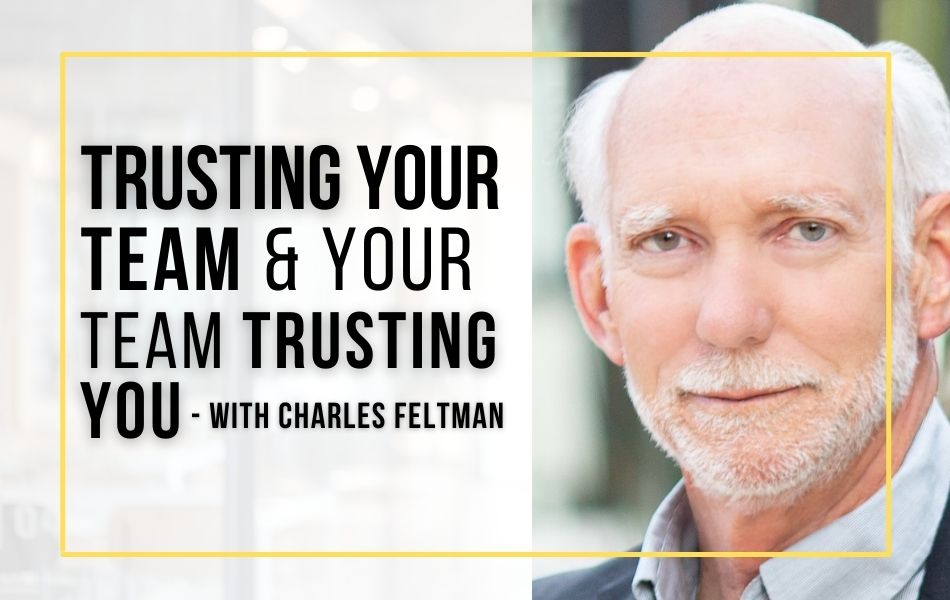
202. When Someone Doesn’t Like What You Did or Said
About this Podcast
Ep. 202 – Ever had that moment when what you said or did unexpectedly turned someone’s mood sour?
As a leader, handling dissatisfaction within your team is inevitable and can require emotional intelligence and managerial finesse. While it can be uncomfortable delivering news or making decisions that not everyone likes, it’s your responsibility as a leader to make tough calls when needed.
So how can you navigate the delivery of unpopular decisions, while being a compassionate leader and maintaining your effectiveness?
In this episode, Ramona provides insights into how managers can face tough situations that arise when team members disagree with news, decisions, or directives. She provides practical strategies and talking points that will help you maintain your effectiveness as a leader amidst uncomfortable yet inevitable conflicts.
Check it out on YouTube here.
Episode 202 Transcript:
0:00:00 Ramona Shaw: This is episode 202, and we’re going to talk about what to do and what to think when someone doesn’t like what you do or say.
0:00:08 Ramona Shaw: Here’s the question. How do you successfully transition into your First official leadership role?
0:00:13 Ramona Shaw: Build the confidence and competence to lead your team successfully and establish yourself as a respected and trusted leader across the organization? That’s the question, and this show provides the answers. Welcome to The Manager Track podcast. I’m your host, Ramona Shaw, and I’m on a mission to create workplaces where work is not seen as a source of stress and dread, but as a source of contribution, connection and fulfillment.
0:00:36 Ramona Shaw: And this transition starts with developing a new generation of leaders who know how to lead so everyone wins and grows. In the show, you’ll learn how to think, communicate, and act as the confident and competent leader you know you can.
Be welcome to The Manager Track podcast. If you’ve been in a formal or informal leadership role, you’ve most definitely come across a situation where something that you say or do causes another person to be frustrated, disappointed, sad, or just in disagreement. And when you have authority in a way, or it’s going to be your decision, your call to make, you’ll probably have to live with another person not liking you for a moment or not being pleased or happy with either. Again, what you said, what you decided, what you’re doing.
And for many people, this can kind of be uncomfortable. This can be hard because our natural instinct as human is to want to be liked. And most of us, over the course of our lives, we have to get more grounded in our own views, our own beliefs, and be less affected by other people’s opinions about us. And this growth, this journey of growth can feel uncomfortable at times. And for many, especially new managers who now find themselves more exposed to situations where they have to make decisions that not that straightforward and are often not liked by everyone.
0:02:01 Ramona Shaw: That’s inherent in being a leader in the leadership role, that those situations or this growth is accelerated and the discomfort just becomes more stronger and stronger. And I want to talk about this because it comes up in coaching conversations with my clients a lot. And many people think there’s either something wrong in how they made a decision or what they said or did that then therefore made someone else be upset or didn’t like what they did. So they make that mean that they did something wrong.
0:02:37 Ramona Shaw: That’s one. Or they just have a hard time coping with the fact that they have to make these decisions and they feel guilty, or they feel they need to now go solve their other person’s feelings and they spend a lot of time trying to explain themselves or trying to support the other person and finding solutions for them so that they can feel better. And I want to talk about this because both of these behaviors can undermine your leadership effectiveness.
0:03:05 Ramona Shaw: So the first thing I want to emphasize is disagreement is normal. You cannot prevent it. And in fact, if your team members never disagree with you and never communicate any disappointment or frustration or just dissent to you or about the decisions that you’re making, it’s likely that they don’t feel safe in conversations with you to bring those up. If people bring it up to you and they address it directly bit you, the good news is they think that you’re open to these kind of conversations and they feel that you’re creating a safe space to have it and address it.
0:03:44 Ramona Shaw: So that is initially a good sign. Now, it depends on how you’re responding to this. And I want to give a quick example here, and I’m making a bit of an extreme example to show what that could look like and then for us to talk about responses. So imagine you’re working at a company, a tech company, and you’re about to launch a new software product. Let’s say the stakes are high. The deadline is tight.
0:04:09 Ramona Shaw: The leadership team overall, including you, decides to implement a mandatory overtime for the next month to launch this product by the deadline. So you as the leader, you announce during a team meeting that this mandatory deadline is going to come into effect, and this is to ensure that the product can launch on time. There’s a lot of pressure from stakeholders, the board, from investors and so forth to make this happen. And because of that, everyone on the team needs to work an additional 3 hours daily, including Saturday.
0:04:43 Ramona Shaw: And you’re now emphasizing the importance of this push and how big this will be for the company. And you’re saying, I’m appreciating everybody buying into it and teamwork, and we’re going to make this happen. And you’re painting the vision and all of that. And of course, you recognize this is a big ask to make, but you’re also clear that this decision was made on the leadership team, not by yourself alone. So now you’re representing it.
0:05:09 Ramona Shaw: You’re trying to rally the team around this idea, this big vision, and what it’ll feel like and be like once this product launch has been successfully released. But you have one particular team member on the team. Let’s call that person Jordan. He is a software developer and he is also the parent of young children. And you can tell immediately in the meeting that Jordan is getting really frustrated by this decision.
0:05:34 Ramona Shaw: He values, and you know that he values work life balance. He’s chosen to work for your company specifically because of the flexible working hours and the remote work policy. So now all of a sudden, we’re imposing this mandatory overtime, or you are imposing this mandatory overtime without consulting them first. Right. And in Jordan’s view, without considering personal circumstances. And Jordan, of course, feels really disrespected.
0:06:01 Ramona Shaw: He feels that you don’t acknowledge his personal commitments, you don’t recognize what’s important to him, and he’s very frustrated and specifically frustrated with you. He may recognize, like, yeah, okay, the c suite may want that, but you, as my manager, you should have advocated on my behalf, you should have pushed back. You should have never agreed to this. Now you and rush start to recognize, like, yeah, I’m bit in a sandwich, right? On one hand, you probably can relate and be empathic to Jordan and Jordan’s situation.
0:06:31 Ramona Shaw: On the other hand, though, kind of your hands are tied. If the entire C suite and everyone else is on board with this decision, you’re representing leadership in this moment. So you’re going to have to go to your team and ask for this. And of course, you’re hoping everyone will just buy into this and everyone will be, yay, let’s go. So, while this may sound like a bit of an extreme example, these kind of unpopular decisions are just part of being a leader. And the frustration of team members is also something you have to learn to accept and to not shy away from in a situation like this. There’s a few really important things I encourage you to consider.
0:07:11 Ramona Shaw: One, nothing went wrong. The frustration here is normal. Don’t try to make everyone happy. Acknowledge that sometimes decisions have to be made or are being made and half the team will not be happy about it. And so the biggest challenge here is to allow someone else to have their emotional response to whatever is going on without you feeling like you have to solve for them. You and all of us individually are responsible for our own emotional lives and our emotional reactions.
0:07:47 Ramona Shaw: It’s not for someone else to make us happy, not for someone else to take care of our emotions. We are responsible for that. You are for yours and I am for mine. Now, that doesn’t mean I’m oblivious to what my actions or how my actions impact you, but it means that when I see you’re frustrated or Jordan is frustrated, I don’t try to make Jordan happy. Instead, I can actually be fully compassionate with Jordan and understand where he’s coming from and acknowledge his emotion because I recognize this is not about me here.
0:08:24 Ramona Shaw: This is about Jordan not liking the decision. So with that attitude shift or mindset shift, I can go back to Jordan and say, hey, Jordan, I see this is difficult for you. I know that you value flexibility. I know that you value your personal time and that this is a big ask and an ask that you did not expect, not anticipate and you were not consulted for. I understand that you’re frustrated and you can even say if true that if you were in their shoes that you might feel similarly.
0:08:57 Ramona Shaw: Now, if it’s not true, don’t say that. But if true, you could bring that up. Now, I’m actually fully compassionate and empathic to the other person, to Jordan in this case, without trying to make him feel any better. And he can feel heard as a result of that. The only way though, for me to do this again is, one, let him have his emotional response to this without thinking that anything is going wrong.
0:09:24 Ramona Shaw: That’s just part of the decision. It’s to be anticipated and it’s normal. Two, that I’m not responsible for his emotions. I’m responsible for my emotions and of course I’m responsible for my actions and making sure that I do the best I possibly can in being an effective leader and making good decisions and representing the organization well. So of course we’ll get to that in a moment. We’ll need to see if there’s something for us to learn.
0:09:53 Ramona Shaw: But beyond that, this is about Jordan right now. And I acknowledge Jordan. And then once Jordan feels acknowledged and we talk about this and then we shift to talking about the problem and say, okay, listen, I understand all this and here is the scenario that we’re dealing with. We have this deadline come up. We looked at a number of different options on how we could go about it and there is simply no other way.
0:10:21 Ramona Shaw: And so we are asking for this additional overtime and here’s how we’re compensating for it. Now, of course Jordan has a choice. Jordan can quit if he wants to. Jordan can say, I’m not going to show up for that. And of course there’ll be consequences to that. That is obvious for both parties. But then once you empathize with them first and then two, you communicate and provide transparency as much as you can and you explain the why and you let them voice their opinions about it.
0:10:52 Ramona Shaw: Once that’s on the table, then you can talk about options and say, look, option one is you’re on board and here’s what that would look like option two is you’re not on board. And if you choose to not be on board, then let’s have a separate conversation of what that would look like. And I hope it’s not that. I hope that we can find a way to make this work for the next month until the deadline of the product launch because you’re such a valued team member and because we really need you here, and we hope to make this a fairly compensated deal.
0:11:25 Ramona Shaw: We talk about solutions only after we fully acknowledge their emotional response to this and their perspective on it and opinions on it, and not to think anything is wrong with that. That’s really important for most of us. That requires a bit of a change in how we think about emotional responsibility. If we think that our actions are the reasons why someone else feels a certain way now we start to feel responsible.
0:11:50 Ramona Shaw: When someone’s angry or disappointed and we’re trying to solve it, we might go in and say, I’m really sorry. I wish I was able to make a different decision. What can I do to make you feel better? And really though, you can’t do anything different. It’s been decided and you needed to ask them. So your hands are tied. And instead of empathizing, you’re now losing a bit of credibility right in that conversation because you’re trying to resolve it, you’re apologizing, you’re uncomfortable, but really can’t do anything about it.
0:12:25 Ramona Shaw: So let me quickly recap what we’ve covered so far. One, really embrace this idea that we all are responsible for our own emotions. And when someone is unhappy or disagrees with what you’re doing or saying, to be able to empathize with them without feeling responsible for the emotions once that’s done. Second, you can talk about the solutions. You can address the options that are on the table. And then separate from that, you can have this internal dialogue, or maybe in conversation with other people or the person affected.
0:12:57 Ramona Shaw: What can you learn about this situation for yourself? Like, understand where is it coming from? Especially if you were blindsided. You didn’t expect a negative response from someone. Be curious of their perspective. See if there’s something that you could have said differently, done differently, that would have still allowed you to be effective in your leadership or management role and your decisions and so forth, but also would have mitigated the emotional response or the conflict that came out of it.
0:13:28 Ramona Shaw: So that is the self reflection, the self assessment, being curious, trying to learn from them, staying curious in the conversation, really being open minded to understand where they’re coming from. Of course, if there is some common ground, if there’s something to negotiate that would allow you to move forward, lean into finding the solutions, but if you can’t, then it’s okay. For example, if you set expectations for everyone on the team, hey, by Friday, everyone needs to turn in their weekly report.
0:13:59 Ramona Shaw: And out of the five, four people turn in their weekly report by Friday, and you have one person who doesn’t turn in their weekly report. You may say on Monday, hey, I needed your weekly report on Friday. What happened? And they may give you reasons why the report is useless or why they missed it. And after they’ve done it a couple of times, you got to go back and say, hey, I really need it by Friday. If I don’t have it by Friday, I can’t consolidate the team’s overall report and deliver that on Monday morning to my boss. And it’s impacting our ability to be presented well as a team.
0:14:34 Ramona Shaw: But also, your numbers are empty, and that doesn’t look good for you. So I need that report. If they don’t like that or if they feel like they’re too controlled or you’re being too rigid, take a moment to reflect. Am I being too rigid? Is there wiggle room? But if there isn’t wiggle room and in this example there wouldn’t be, then be okay with someone else not liking it. Again, that is part of it. It’s okay. Like, I understand you’re not liking it. I still need it, though.
0:15:02 Ramona Shaw: What can we do? We’re not solving for people’s happiness. We’re solving for the problem at hand and finding solutions that work for everyone. And in this case, it worked for the four people, and it works for the executive team or the leadership team, and it works for you. It just doesn’t work for one person, and that’s okay. But that doesn’t mean you did anything wrong. It doesn’t mean that you need to lower your expectations and make exceptions for that one person so that person can stay happy.
0:15:31 Ramona Shaw: That will erode your leadership effectiveness. So I’m going to keep this short and concrete and wrap up this episode. When you find yourself conflicted or feeling guilty or feeling responsible for how other people feel, please be reminded that it’s normal, it’s okay. And there again, the three steps that we’ve talked about to go through in such situations. If you have coworkers or friends who find themselves in such situations often and they would benefit from hearing this, please pass it along so they can feel a bit validated and affirmed that everything is okay and that these situations are part of being in a manager role.
0:16:09 Ramona Shaw: Thank you for tuning in to The Manager Track podcast. We’ll be back next week with another episode. Until then, have a great and productive week. Ciao Ciao.
0:16:18 Ramona Shaw: If you enjoyed this episode, then check out two other awesome resources to help you become a leader people love to work with. This includes my best selling book, the Confident and competent new manager, which you can find on Amazon or@ramonashaw.com slash book, and a free training on how to successfully lead as a new manager. You can check it out at Masterclass, these resources, and a couple more you’ll find in the show notes down below.
REFLECTION & DISCUSSION QUESTIONS
- Can you recall a time in the past few months when a team member disagreed with a decision you made? How did you feel in that situation? (nervous, defensive, frustrated?) Did the team member express their disagreement directly or indirectly? (body language, passive-aggressive comments, direct confrontation). What did you do well as you handled that situation? What could you do differently next time?
- Imagine you need to announce a decision that you know some team members won’t be happy with. What steps can you take to prepare for this conversation?
- How can you, as a leader, ensure you don’t lose your effectiveness when faced with team disagreements? (Consider focusing on solutions, separating emotions from the issue, etc.)
RESOURCES MENTIONED
- Learn how to turn your 1-on-1 meetings from time wasters, awkward moments, status updates, or non-existent into your most important and valuable meeting with your directs all week. Access the course and resources here: ramonashaw.com/11
- Have a question or topic you’d like Ramona to address on a future episode? Fill out this form to submit it for her review: https://ramonashaw.com/ama
OTHER EPISODES YOU MIGHT LIKE
- Episode 31: Master Any Conflict Situation
- Episode 41: From Bud to Boss – A Coaching Conversation with Jen
- Episode 45: Want to be Liked or Respected? Why it’s the Wrong Question to Ask
- Episode 68: Stop Feeling Responsible For How Other People Feel
- Episode 182: Tough Moments of Leadership – Q&A
WHAT’S NEXT?
Grab your copy of Ramona’s best-selling book ‘The Confident & Competent New Manager: How to Rapidly Rise to Success in Your First Leadership Role’: amzn.to/3TuOdcP
If this episode inspired you in some way, take a screenshot of you listening on your device and post it to your Instagram Stories, and tag me @ramona.shaw.leadership or DM me on LinkedIn at linkedin.com/in/ramona-shaw
Are you in your first manager role and don’t want to mess it up? Watch our FREE Masterclass and discover the 4 shifts to become a leader people love to work for: ramonashaw.com/masterclass
Don’t forget to invest time each week to increase your self-awareness, celebrate your wins, and learn from your mistakes. Your career grows only to the extent that you grow. Grab your Career Journal with leadership exercises and weekly reflections here: ramonashaw.com/shop
Love the podcast and haven’t left a review yet? All you have to do is go to ramonashaw.com/itunes and give your honest review. Thanks for your support of this show!
* Disclaimer: Shownotes may contain affiliate links. That means that I am awarded a small commission for purchases made through them, at no added cost to you.







